 The first Firefox OS phones could be just days away from hitting retail. Mozilla has announced that the regional rollout of the first foxy phones will begin soon.
The first Firefox OS phones could be just days away from hitting retail. Mozilla has announced that the regional rollout of the first foxy phones will begin soon.
There are just a couple of devices so far, the Alcatel One Touch Fire and the ZTE Open, and the latter launches in Spain on Tuesday for just €69.
Needless to say, it doesn’t feature headline grabbing specs. It’s a 3.5-inch HVGA device powered by a 1GHz processor and 512MB of memory. That’s the sort of spec one would expect from a mid-range Android handset launched in 2011, but that sort of seems to be the point.
Mozilla doesn’t want to compete in the high-end, it thinks it has a very lean operating system that could bring most smartphone features to first-time smartphone buyers. Smartphones are overtaking feature phones in terms of worldwide sales as we speak and cheap smartphones are expected to fill the gap.
It seems like a sound approach, but the smartphone market is already overcrowded and it’s dominated by two or four operating systems, depending on whom you ask. There doesn’t appear to be much room for another competing platform, but Mozilla is going after a small niche. Apple, BlackBerry and to some extent Microsoft, don’t really matter in this price segment.
Android, however, remains a force to be reckoned with. There are dozens if not hundreds of cheap Android phones on store shelves, with a tried and tested OS and a huge app ecosystem. What’s more, last year’s models often end up in the bargain bin, hence it is possible to get something even better than an entry-level phone for peanuts.
Mozilla thinks it can do better, with an OS specifically designed to run well on a meagre serving of silicon and this might be what differentiates its products in the long term. The hope is that consumers will choose a frugal phone with a lean OS instead of an outdated Android device that doesn’t really support all the nice features offered by Google in its latest Android builds.
The approach might work, especially in emerging markets, but for the time being the platform is rather limited and untested, although initial reviews were positive.
 All 25 major car brands reviewed in Mozilla’s latest edition of *Privacy Not Included (*PNI) received failing marks for consumer privacy.
All 25 major car brands reviewed in Mozilla’s latest edition of *Privacy Not Included (*PNI) received failing marks for consumer privacy.






